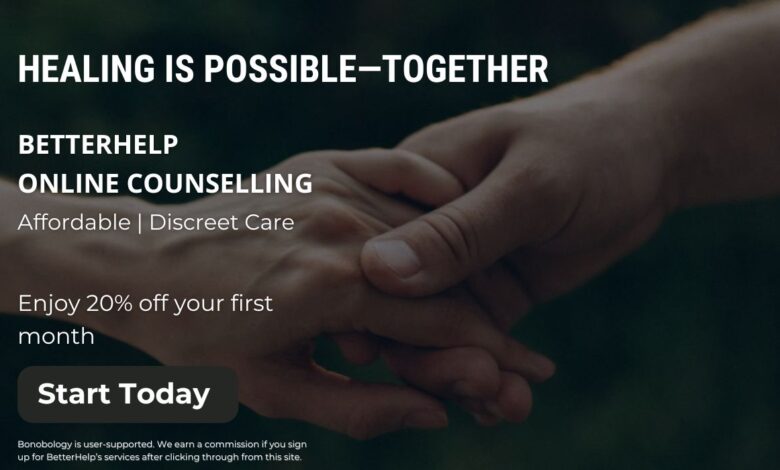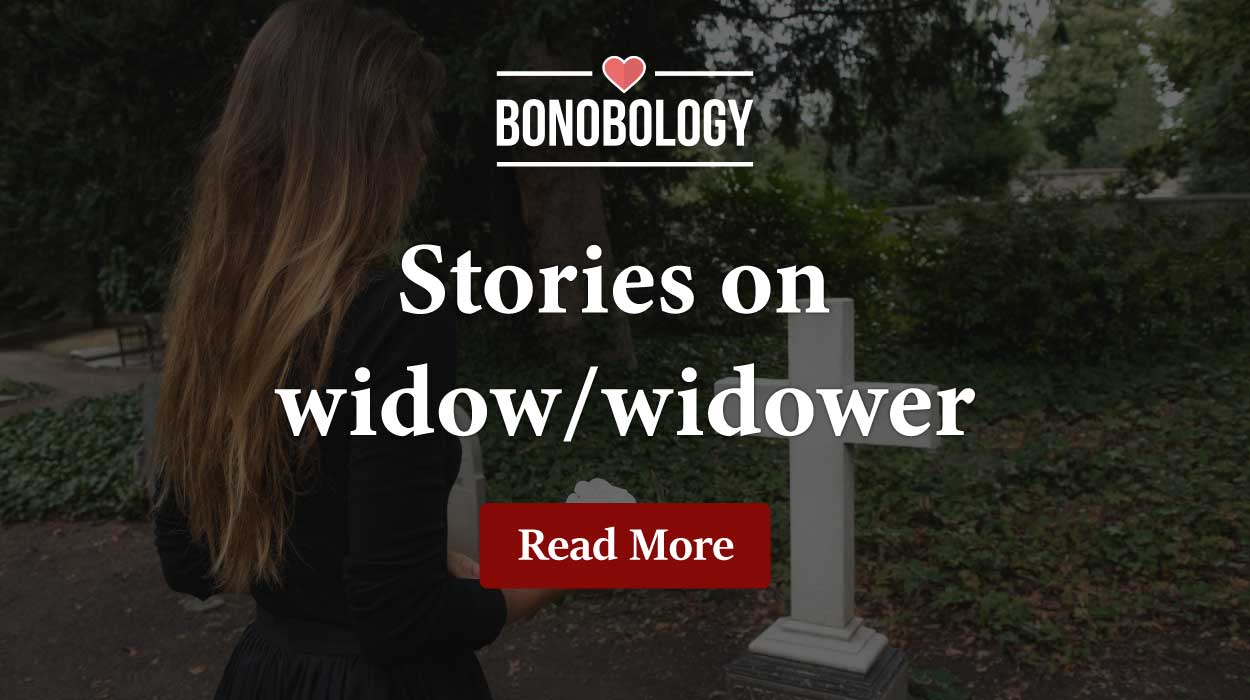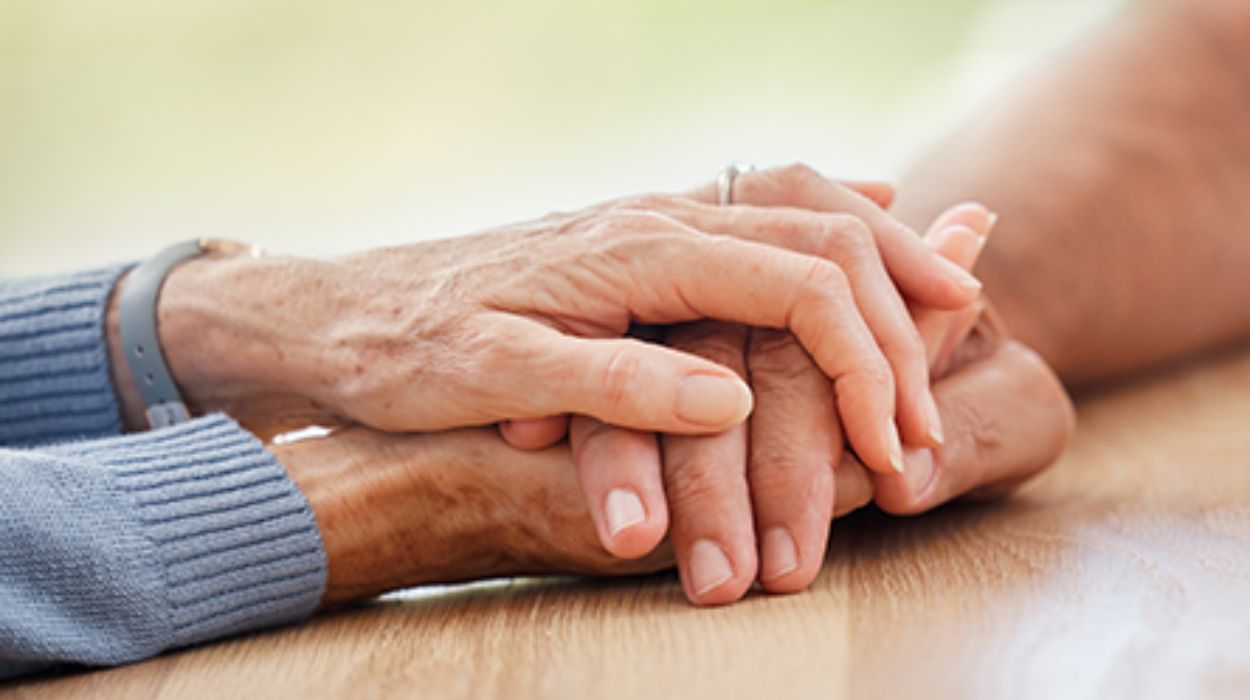How to Rebuild Your Life After Widowhood In Your 50s

Losing your spouse is an indescribable heartbreak. You’ve not only lost a partner, but perhaps your sense of security and direction in life. It’s completely normal that you feel overwhelmed by grief and isolation. When you’re going through this phase, where the days and long nights blur together and even getting through simple tasks seems impossible, the thought of how to rebuild your life after the death of a spouse can seem unrealistic. However, surviving widowhood and starting a new chapter in your 50s isn’t unrealistic or impossible.
Nor are you alone in this journey. Millions have walked this path and found light on the other side. As renowned relationship expert Dr. Sue Johnson notes, “Love has an immense ability to help heal the devastating wounds that life sometimes deals us.” In other words, the love you shared will always be part of you, and in time, new connections can help mend some of the pain.
Rebuilding your life after widowhood doesn’t mean forgetting your late partner or “moving on” as if nothing happened. Instead, think of it as moving forward—carrying your spouse’s memory with you as you gradually step into a new chapter. This article will walk you through that delicate process with compassion and hope. We’ll talk about grieving, steps to healing after losing a spouse, how to know when you might be ready to date, and ways to gently dip your toes back into socializing and possibly dating when you feel ready.
Grieving—Navigating Sorrow Without a Timeline
Surviving widowhood and learning to come to terms with the new reality of your life, first and foremost, means accepting that grief after losing a spouse isn’t linear—it comes in waves. One moment you’re getting through the day, the next, a song or an empty chair hits you out of nowhere. That’s completely normal. There’s no “right” way to grieve, and no set timeline to follow.
You might feel shock, sadness, anger, guilt, or deep loneliness. Grief is messy and deeply personal. You’ve probably heard of the “five stages of grief,” but those were originally based on people facing their own terminal illness, not those mourning a loved one.
For most widows and widowers, grief ebbs and flows. In fact, many people keep an inner connection with their late partner, something psychologists call “continuing bonds”. You might talk to their photo, keep traditions alive, or just carry them in your heart. That’s not being stuck; it’s part of healing
There’s also no such thing as “closure” in the way people often talk about it. You don’t wake up one day magically over it. What actually happens is that, over time, you learn to live with the loss. As one widowed person told The Atlantic said, “I knew that people could find a way to carry infinite sadness and still have a joyful life.”
Related Reading: First Relationship After Being Widowed – 18 Dos And Don’ts
So, remind yourself that it’s okay to feel moments of joy, curiosity, or even hope, even while grieving. That doesn’t mean you’ve stopped loving your spouse. The pain might always be there in some form, but it can soften over time, making space for new experiences.
Grief isn’t just emotional – it can show up physically too. Exhaustion, memory issues, appetite changes, and sleep problems are all common. Many people describe early grief, typically during the first year after losing a spouse, as being in a fog or feeling like they’re on autopilot. It’s your brain’s way of protecting you. Right now, your only job is to survive each day. Eat if you can. Rest. Let others help. If you feel like the intensity of your grief is not abating or you’re struggling to cope, consider seeking help from a mental health professional who specializes in bereavement counseling.
Well-meaning friends might push you to “get back out there,” but only you know what you’re ready for. Some people start rebuilding after months; for others, it takes years to even think about dating again. There’s no deadline. However long you need is the right amount of time.
One of the hardest parts of this loss is the shift in identity. You weren’t just a partner, you were part of a team, a shared life, a shared identity. Losing your spouse means losing all that, which can leave you feeling unsure of who you are now. And in the early days, that question might feel irrelevant. But eventually, you’ll start to rediscover yourself—not the same as before, but still whole, still here.
Another important thing to understand about grieving the loss of a spouse is that the goal isn’t to get over your grief. It’s to live with it. To carry your love for your spouse alongside whatever life brings next. Many widowed people describe still feeling their partner’s presence in some way, as a source of strength or comfort in new chapters.
Right now, dating might be the last thing on your mind – and that’s totally fine. Do what helps you cope: cry, remember, journal, pray, talk. Support groups or grief counselors can be a lifeline – it helps to talk to people who truly get it. The bottom line? Be kind to yourself. Grief has no rules. You’ll know, in your own time, if or when you’re ready for whatever comes next.
Related Reading: A Date With A Gigolo… Confessions Of A Widow
Are You Ready For Dating Again After Losing a Partner 7? Signs to Look For
After some time has passed – it could be months, a year, or several years – you might start to wonder, “Am I ready for dating again after losing a partner? ” Deciding to date after losing your spouse is deeply personal. Some people feel ready relatively soon, while others may remain single for a long time. There’s no universally “appropriate” time to wait; the old notion that one must mourn for exactly one year before moving on is a myth. The truth is, “when” to date again is as individual as you are. Instead of a calendar, the better guide is your own feelings and readiness. So how do you know you’re emotionally ready to date again or even open up to someone new? It might not be a lightning bolt moment. More likely, it’ll be a gradual realization. Here are a few common signs experts and widowed counselors often mention that may indicate you’re ready to date again:
1. Your grief has become more manageable
You find you can get through the day without being consumed by sorrow. This doesn’t mean you never feel sad or that you don’t think of your spouse. It means that grief is not the only thing you feel all day; you have room for other thoughts and activities. If you wake up and your first thought isn’t only about your loss, or you go to bed without crying some nights, that’s a positive sign. In essence, you’re no longer “walking in the shadow of your grief” constantly.
2. You feel independent and relatively self-sufficient
After losing a long-term partner, suddenly every responsibility falls on you. Early on, you might feel desperate for someone to fill that void or help carry the load. But dating primarily to “fix” practical problems or loneliness isn’t a great foundation for a healthy relationship.
Bereavement counselors strongly recommend ensuring you’ve learned to carry your own load, that you’re not just looking for a replacement for the things your spouse used to do, before you even consider dating after the death of your spouse. If you can manage day-to-day tasks and find you’re not solely seeking a savior, you’re more likely ready to connect out of desire rather than need.
Related Reading: Remarriage After Death Of Spouse: A Heartwarming Journey Of A Woman
3. You aren’t constantly comparing others to your late spouse
This is a big one. When you can meet new people and appreciate them for who they are, rather than mentally measuring each against your beloved who passed, you may be ready to date. Early in grief, the idea of anyone else even coming close to your spouse’s qualities seems impossible. You might find yourself thinking, “She’s nice, but not as smart as Jane” or “He doesn’t laugh the way John did.” That’s normal at first.
But when you reach a point where you no longer idealize your late partner as the unmatchable standard, and you accept that a new partner will be different (not better or worse, just different), you’re opening your heart to someone new. If you’ve stopped looking for your spouse in every face you meet, you can truly see a potential date as just themselves, and that’s a crucial mindset for a fresh relationship.
4. The idea of dating sparks curiosity and maybe a little excitement
You might find yourself smiling at the thought of male/female companionship. Perhaps you feel a stirring of romantic or sexual attraction again. It could be something as simple as enjoying flirtatious banter or wondering what it’d be like to hold someone’s hand.
Feeling attracted to people or fantasizing about a future with someone is a sign your heart is considering love again. This can be accompanied by guilt—that’s normal—but if some part of you is intrigued by the idea of going on a date or meeting someone, then you may be more ready than you think. You don’t have to be 100% confident; just a willingness to try is a green light.
5. You’ve processed the bulk of your intense emotions
You will always miss your spouse, but by now, you may have worked through the rawest feelings of anger, deep depression, or guilt. You might still have hard days, especially around anniversaries or triggers, but you’ve likely found healthy outlets for your grief such as a support group, journaling, or therapy.
If you find that your late partner’s memory brings more smiles than breakdowns, or that you can talk about them without falling apart, it shows a level of healing that can make space for someone new. In short, the loss doesn’t feel like an open wound all the time; it might be more like a scar now, one that still aches occasionally but no longer debilitates you daily.
Related Reading: 21 Tips For Dating A Widower
6. You feel your life has value and joy to offer
Before inviting someone in, it helps to believe your life is worth sharing. Do you feel you have a handle on things and maybe even some happiness or routine on your own? Perhaps you’ve resumed hobbies, or you enjoy time with friends or family. This indicates you are actively living, not just grieving.
Being able to envision a future for yourself, even if you’re not sure exactly what it looks like, is a good indicator. For example, maybe you’re thinking about retirement plans, or a trip you’d like to take, or you’ve redecorated the house to make it feel like your space. These are signs you’re moving forward and could be ready to integrate someone new into this life you’re rebuilding.
Now, even if you identify with many of these signs, it’s totally normal to feel conflicted. One day you might think, “Yes, I’m lonely, I want to date,” and the next day, “No one will ever measure up, I can’t do this.” Ambivalence doesn’t mean you aren’t ready; it just means you’re human and your heart is still tender. You can be both hopeful and apprehensive at once. The key is that the idea of dating no longer feels impossible or repulsive – it might still be scary, but perhaps it also feels like it could be part of your life again. Trust your intuition. Deep down, you likely have a sense of whether you’re ready. Above all, give yourself permission to try when you’re ready, knowing you can always change your mind.
Carol, 59, lost her husband of 35 years to cancer. For over a year, she lived in a fog of grief, convinced she’d had her one great love. Joining a church bereavement group helped her feel less alone, and she grew close to a kind widower named Jim. When he asked her to dinner, she nearly declined—terrified and unsure. Her daughter encouraged her: “It’s just dinner, not a proposal.”
The evening brought unexpected laughter, and later, tears of guilt and relief. Over months, Carol and Jim developed a slow, respectful friendship-turned-companionship. She still visits Dan’s grave and talks to his photo, but now also shares coffee and quiet joy with Jim. Carol says, “I feel like I’m coming back to life, piece by piece.” Her story is a testament to baby steps and the truth that it’s okay to love again without letting go of the past.

Building Confidence Again—Feeling Desirable and Whole
Dating after losing a spouse can be daunting. Many widowed individuals struggle with low self-esteem and wonder, “Who would want me now?” This is exactly what Rita, who has been widowed twice by 50, felt and decided to swear off dating altogether. However, her daughter nudged her to sign up on a widows and widowers dating site, where she met Sam—a widower who truly understood her pain. They bonded over late-night messages about grief, parenting, and loneliness.
After a year, they agreed to meet. Nervous and guilty, Rita hesitated, but the connection in real life was undeniable. Over time, their friendship turned romantic. Rita wrestled with guilt, especially on tough anniversaries, but Sam gently reassured her: “I’m not here to replace him—I’m here because I care about you.” That shifted everything. Rita now says, “I know my love in heaven is smiling.”

Could there be a better reminder that you are worthy of love, desire, and connection—at any age? However, opening your heart and mind and accepting this fact can take time. Here’s how you can gently nudge yourself in that direction, rebuilding your confidence, one step at a time:
- Remind yourself age is not a barrier: People over 50 often seek deeper values like kindness, humor, and resilience. As a widow/er, you bring emotional depth, loyalty, and life experience—attractive qualities in any relationship
- See that everyone has baggage: Whether it’s divorce, caregiving, or loss, no one over 50 is unscarred. The right person will appreciate your strength and journey
- Warm up your social skills: Feeling rusty? Start small—make conversation with strangers, smile more, join social groups. These little interactions help rebuild social confidence
- Focus on self-care: A new haircut, comfortable clothes, or light exercise can uplift your mood and self-image. When you feel good in your skin, it shows
- Rediscover yourself: Take up an old hobby or try something new like dance, art, or learning a language. It reminds you that you’re still growing—and interesting
- Intimacy is possible, in your own time: Feeling nervous about sex again is normal. Communicate openly with a partner and go at your pace. You deserve affection and closeness when you’re ready
- Get support if needed: Therapy or support groups can help you process grief and build confidence. “Perfection is not the price of love. Practice is,” says relationship expert Dr. John Gottman
- Affirm your worth: List your strengths or ask a friend what they value in you. Your lovable qualities didn’t vanish with your spouse—they’re still very much alive
- Be patient and compassionate. Awkward moments will happen—laugh them off. You’re not “damaged goods,” you’re a resilient person learning to love again
Related Reading: The Top 5 Signs A Widower Is Serious About Your Relationship
6 Tips to Start Dating Again After Losing a Partner
When you feel emotionally ready to dip your toe back into dating, the big question becomes, how? The dating scene has likely changed since the last time you were single. It’s completely normal to feel overwhelmed or clueless about where to begin. The good news is, you can start small and low-pressure. There are many gentle, senior-friendly ways to meet people and ease into socializing again, even as you navigate the different aspects of how to rebuild your life after death of spouse:
1. Reconnect socially, without the pressure of romance
Often the first step is simply engaging with the world socially. Say yes to that brunch with friends, join a club or group based on your interests, attend community events, or consider volunteering. This gets you out of the house and around people. The goal here isn’t immediately to find a date, but to revive your social life.
You might make new friends or strengthen old friendships, which in turn can expand your circle. Sometimes, a new relationship comes from mutual friends or casual connections. A friend might introduce you to a widowed neighbor, or you might hit it off with someone in your hiking club. Even if that doesn’t happen right away, just being more socially active will make you feel more comfortable when you do decide to date. It also gives you things to talk about and share when you start meeting potential partners .
2. Consider grief support or special interest groups

A bereavement support group or platforms that facilitate widows meeting widowers for friendship, can be a double win. You get much-needed support that can help you figure out how to rebuild your life after the death of a spouse and a chance to meet others who are in a similar situation as you. Then there are social groups specifically for single seniors or those over 50. Check local community centers, religious institutions, or websites like Meetup.com for gatherings like walking groups, travel clubs, and wine tasting groups, geared toward older adults. Being in a group gives you a chance to interact with like-minded people in a low-pressure setting. You’re just a person in a group, enjoying an activity, and any connection can grow more organically from there.
3. Try low-pressure online dating apps for seniors
If you feel ready to specifically seek a date, online dating can be a useful tool—yes, even for over 50 singles. In fact, there are several dating websites and apps such as OurTime, SilverSingles, SeniorMatch, and even niche widows and widowers dating sites that tend to be more easy-going and user-friendly. You can dip your toe in by creating a profile and browsing. You don’t have to message anyone right away. You’ll notice lots of profiles mentioning being widowed or looking for companionship, which reminds you that you’re not alone in this stage of life.
When you do create a profile, keep it honest and positive. You might mention that you’re widowed but don’t need to dwell on it in the profile. Focus on what you enjoy and are looking forward to. For example: “I’m a retired teacher, book lover, and proud grandmother. Widowed for 3 years, I’m ready to enjoy life’s next chapter – looking for a companion to share laughter, walks, and good conversation.” This signals that you have a past but are also interested in the future.
Related Reading: Am I Moving On Too Quickly After Death Of Spouse—How To Decide
4. Go at your own pace with dating invitations
Maybe there’s a casual acquaintance or friend-of-a-friend who has shown interest in you. If you feel ready, you could say yes to a coffee. Keep initial meetups short and simple—think coffee dates, a walk in the park, or a lunch. These daytime, brief meetings have less pressure than a formal dinner date. Remember, it’s just one meeting, not a lifetime commitment. You can always decide after that to continue or not.
5. Use “dating buddies” and support networks
One clever tip to start dating after losing a partner is to enlist a “dating buddy”, to navigate the experience together. Having a trusted friend to laugh with about the awkward parts or to debrief after a date can reduce anxiety. They can also give you a pep talk if you’re feeling discouraged. If your children are supportive, you might even confide a bit in them about your foray into dating. Or lean on your friends and peers for support and encouragement.
Re-entering the dating world after loss doesn’t have to be daunting—it can start as simply as coffee with someone new. Keep things light: low-pressure meetups, no expectations, and a focus on connection, not commitment. Not every date will lead somewhere, and that’s okay. Think of it as part of healing, part of learning to enjoy life again. Companionship—even platonic—can be deeply fulfilling. Take breaks when needed; there’s no deadline. Explore at your own pace and keep an open mind. As Esther Perel beautifully said, “Cultivating an openness to possibility makes life richer.” Just saying yes to life is a powerful, hopeful beginning.
Overcoming Guilt and Comparison – Loving a New Partner While Honoring the Past

One of the hardest parts of dating after losing a spouse is managing the guilt. You might feel like you’re betraying their memory, especially when you begin enjoying someone else’s company. Or maybe you worry others will judge you for “moving on.” But here’s the truth: dating again doesn’t mean you’ve stopped loving your late partner.
That love doesn’t disappear — it just takes on a new shape. As one widow says on Young Widowed & Dating, “You honor a spouse by how you embrace life after he or she is gone.” So, think of any new romantic connection as a reflection of how much your heart can grow — not a sign that your old love is gone.
If the guilt creeps in…
You might catch yourself imagining how your spouse would react, feeling like you’re “cheating.” But ask yourself this: if the roles were reversed, what would you want for your spouse? Most likely, you’d want them to find happiness again. This can help you reframe the story you’re telling yourself. Instead of “I’m replacing them,” try: “I’m starting a new chapter while keeping their memory close.” If you’re struggling with guilt or are unable to make sense of conflicting emotions stemming from making space for someone new in your life, talking to a skilled and experienced mental health professional can help you make sense of your emotions. Great news is, you can now do that from the comfort of your home.
You don’t have to “erase” the past
You can still honor your spouse while making space for someone new:
- Keep photos or mementos, if it feels right
- Visit their grave on special days
- Share stories with your new partner.
If something your new partner does brings back memories, share it. You might say, “This reminds me of something [spouse’s name] used to do.” A good partner will understand that your past shaped who you are. If they ever ask you to stop talking about your late spouse, that’s a red flag. A healthy relationship respects your history.
Related Reading: My Husband Passed Away And I’ve Never Been Happier
Steer clear of the comparison trap
Even if guilt fades, comparison might stick around. You may find yourself measuring your new partner against your spouse—their laugh, habits, or even how they butter toast. That’s normal. Just be mindful that it’s often not a fair comparison. We tend to idealize loved ones we’ve lost. You’re comparing someone real and present—with flaws and quirks—to a memory softened by time. Here’s how to shift that mindset and free yourself from the comparison trap:
- Remind yourself, “This isn’t about replacing. It’s about building something different.”
- Accept the differences. Maybe your late spouse loved quiet nights in, and your new partner thrives on adventure. That’s not better or worse, it’s just different
- Let the new relationship be its own story
It’s okay to still love your spouse while you grow to love someone new. Love isn’t a switch you turn off and on. Research shows that widowed people can maintain an internal bond with their late spouse while forming healthy new relationships.
Key Pointers
- Grieving a spouse is deeply personal, non-linear, and doesn’t follow a set schedule; healing includes continuing bonds, physical effects, and emotional waves
- Widowhood brings a loss of shared identity, but over time, it’s possible to rediscover oneself while still carrying love and memories of the past
- Signs you may be ready to date again include manageable grief, regained independence, emotional healing, openness to new connections, and feeling joy again.
- Feeling desirable and worthy of love again takes time; self-care, social re-engagement, and emotional support help restore confidence and self-worth
- Start with socializing, join support or interest groups, explore senior-friendly dating apps, and take small, pressure-free steps toward new connections
Final Thoughts – Embracing Hope And New Beginnings
Rebuilding your life after losing a spouse is one of the bravest, most difficult paths a person can take. If you’ve made it this far, pause and recognize your strength. The very act of considering healing or even new love speaks to your courage and the love that still lives within you. Grief may never disappear, but it changes—and can begin to coexist with joy.
You are not leaving your spouse behind by choosing to embrace life again. Their memory lives on in who you are and how you move forward. Whether that future includes a new partner, deeper friendships, or a fulfilling solo life, there’s no one “right” outcome. What matters is that you’re building a life that feels meaningful to you.
So go forward with an open heart and the knowledge that you are not alone. Your story is still unfolding, and there’s so much left to write. Hope, healing, and maybe even new love await. And that’s something to hold onto.
What I Regret After The Death Of My Spouse
Dating In The 50s – 15 Tips To Do It Right
Men Over 50 – 11 Lesser Known Things Women Should Know
Your contribution does not constitute a charitable donation. It will allow Bonobology to continue bringing you new and up-to-date information in our pursuit of helping anyone in the world to learn how to do anything.
Share Feedback




